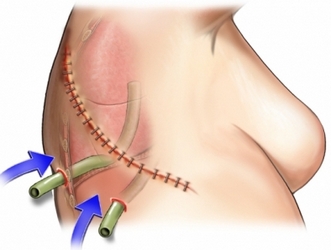Thoracotomy – The operation in the area of the lung
Description thoracotomy
Thoracotomy – surgery to open the chest wall. The operation allows access to the lungs, throat, aorta, heart and diaphragm. Depending on the surgical site, thoracotomy may be done on the right or left side of the chest. Sometimes a small Thoracotomy may be made on the front of the thorax.
Reasons for thoracotomy
Thoracotomy can be done, that:
- Confirm the diagnosis of diseases of the lungs or chest;
- Perform surgery on the heart or blood vessels of the lungs and heart;
- Treat tracheal disorders;
- Remove part of the lung or the entire lung;
- Treat disorders of the esophagus;
- Remove the lung tissue, that collapsed due to disease or injury;
- Remove pus from the chest;
- Remove blood clots from the chest.
Possible complications thoracotomy
If you plan to thoracotomy, you need to know about possible complications, which may include:
- Bleeding;
- Infection;
- Damage to organs in the chest;
- Lingering pain (in some cases);
- Reaction to anesthesia;
- The accumulation of air or gas in the chest.
Factors, that may increase the risk of complications:
- Extensive injury, It involves many parts of the body;
- Age;
- Smoking;
- Previous stroke or heart attack;
- Previous radiatsionnaya therapy;
- Chronic health problems.
How is thoracotomy?
Preparation for the procedure
The doctor may prescribe:
- Medical checkup;
- Blood and urine tests;
- Roentgen, CT scan or MRT chest;
- Pulmonary function tests, to see, how well they work;
- Heart function tests.
On the eve of the operation:
- Consult your doctor about the drugs taken. A week before the surgery may need to stop taking some medicines:
- Aspirin or other anti-inflammatory drugs;
- Blood thinners, such as clopidogrel (Plaviks) or warfarin;
- You may be asked to use an enema, to cleanse the bowel;
- Do not eat or drink the night before surgery;
- To minimize complications, you need to quit smoking, at least 2-3 weeks prior to surgery.
Anesthesia
The operation is performed under the general anesthesia, during the operation the patient is asleep.
Procedure thoracotomy
You will lie on your side with your hands up. Between the two ribs along the entire length of the cut will be made. Chest wall will be open. In some cases, the doctor may use a different method.
The doctor performs a necessary operation with open chest. Once the operation is complete, breast are placed one or more drainage tubes, that prevent the accumulation of blood and air in the chest. The chest is closed. The incision closed with stitches or staples, held ligation, to prevent infection.

Immediately after the thoracotomy
You will be directed to the ICU for recovery and observation.
How long will thoracotomy?
Duration of operation – 3-4 hour or more.
Thoracotomy – Will it hurt?
Anesthesia prevents pain during the procedure. You may feel some discomfort after surgery. The doctor will give you medicine, which will help reduce the painful symptoms.
In some cases, a thoracotomy may lead to chronic pain syndrome, which usually feels like a burning pain in the area of operations. It may be associated with increased sensitivity to touch in this area. Pain syndrome usually decreases over time, but, perhaps, require expert help, if pain persists.
The average time of stay in the hospital after thoracotomy
Typically, the length of stay in hospital is 5-10 days. If complications arise, length of stay in the hospital can be extended.
Care after a thoracotomy
Care in a hospital
- After surgery, the body will be placed catheters and tubes. Most of them will be removed after recovery. They will help you to urinate, breathe, through them made meals.
- You may be given antibiotics, painkillers or medications for nausea;
- Often cough and perform deep breathing exercises. This will help keep your lungs clear;
- Get out of bed and get to sit in a chair. Increase the motor activity as recovery.
Home Care
When you return home, Follow these steps:, to ensure the normal recovery:
- Ask the doctor, when it is safe to shower, bathe, or to expose the surgical site to water;
- Drink plenty of fluids;
- Do not smoke;
- Avoid environments, that expose you to germs, smoke or chemical irritants;
- Be sure to follow your doctor's instructions.
Contact your doctor after thoracotomy
After returning home, you need to see a doctor, If the following symptoms:
- Shortness of breath or cough;
- New chest pain or persistent and severe pain in the area of operations;
- Stitches or staples odds;
- The bandages soaked with blood;
- Cough with mucus, yellow, green, or the color of blood;
- Signs of infection, including fever and chills;
- Redness, edema, increased pain, bleeding, or discharge from the incision;
- Severe nausea and vomiting;
- Pain, burning, frequent urination or persistent bleeding in the urine.
